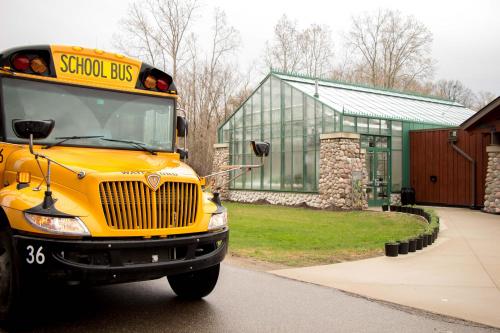National Sustainable Agriculture Coalition suggests 2015 Farm to School Act could benefit Michigan
Farm to School initiatives center around efforts to not only serve local foods in school and early childcare but also to include a variety of initiatives like school garden programs, farmer visits to schools, and field trips to nearby farms.

By Lindsey Jene Scalera, Michigan Voices for Good Food Policy - National Sustainable Agriculture Coalition
A group of students and parents from Beaumont Elementary School in Waterford, Michigan, shuffled off their bus and into the warm greenhouse, whispering at the unfamiliar sights and smells. During their visit, students got a close-up view of hydroponic growing systems, tasted fresh herbs, released beneficial ladybugs, and started their own lettuce seeds. But these students were not visiting a farm in the traditional sense, rather, they had taken a field trip to the campus of Henry Ford West Bloomfield Hospital in West Bloomfield, Michigan.
The students’ involvement in the program, Chef for a Day/Farmer for a Day, which included a kale chips tasting and nutrition lesson in a state-of-the-art demonstration kitchen, is just one part of a larger, district-wide farm to school initiative spearheaded by Doreen Simonds, Waterford School District’s Food Service Director.
Doreen says she was skeptical at first. “We thought this would never work - you can only grow things in Michigan for a couple of months and we were unsure how we could bring in food from local farms when we (our schools) are not really here in the summer. It seemed like it was not feasible.” But they carried on, learning more, talking with farmers, and getting connected with resources - including a Michigan Farm to School Grant through the MSU Center for Regional Food Systems and a USDA Farm to School Grant. Eventually they learned that farm to school was not only possible, but could be more affordable and help increase participation in school meals, while also providing educational opportunities for everyone.

Students from Waterford Public Schools toured and tasted fresh produce from the Henry Ford West Bloomfield Hospital Greenhouse during the Chef for a Day/Farmer for a Day field trip. Photo courtesy Lindsey Jene Scalera, Michigan Voices for Good Food Policy.
WHY IS FARM TO SCHOOL IMPORTANT?
Farm to school is a common sense approach to child nutrition that empowers children and their families to make informed food choices while strengthening the local economy and contributing to vibrant communities. The Michigan Farm to School Network describes the scope of farm to school initiatives as centering around efforts to not only serve local foods in school and early childcare but also to include a variety of initiatives like school garden programs, fundraisers using local agricultural products, farmer visits to school classrooms and cafeterias and field trips to nearby farms.[1]
Waterford students are gaining three new school gardens this year and already have salad bars with farm-fresh produce in every cafeteria. Doreen affirms the excitement: “We just hear back from so many kids and parents that the kids are trying new foods at home, so we are working to change our menus and influencing families to make healthier choices.” Waterford is among approximately 470[2] schools in Michigan that report making advances in local food procurement, but as the number of schools participating in farm to school efforts continues to grow, there is a need for support to grow with it.
THE FARM TO SCHOOL ACT OF 2015
The Waterford School District recently received a USDA Farm to School Implementation Grant to help scale up their farm to school programs. Doreen shares, “With the implementation grant, we are enhancing and expanding our farm to school education projects as well as our procurement capacity.”
In Michigan and across the country, more farmers, communities, and schools want to get started in farm to school, but there are many barriers schools face as they work to make connections with growers and scale up how much local food they are able to purchase, process, and serve to students. That is why some extra grant support is helpful. However, according to the National Farm to School Network (NFSN), the demand for the USDA Farm to School Grant outweighs the current available funding by more than 5 times[3].
As part of the upcoming Child Nutrition Act Reauthorization, The National Sustainable Agriculture Coalition (NSAC) is working in partnership with the NFSN to rally support for the Farm to School Act of 2015. The bipartisan bill will expand and improve the USDA Farm to School Grant Program to help it better meet the needs of schools, farmers, and communities nationwide. NSAC and NFSN reason that , by including it in the next Child Nutrition Act, Congress can help advance farm to school by: reducing regulatory barriers, providing flexibility for local school districts to include preschools, summer food service program sites, and after school programs in their proposals, increasing the program’s reach with beginning and socially disadvantaged farmers and tribal communities, and increasing the program’s funding to better meet national demand.
National Sustainable Agriculture Coalition Resources
When all the pieces fall into place, farm to school is a win for kids, farmers, and communities. Resources to support this ongoing advocacy work can be found here:
- The NSAC “Take Action” page for up-to-date information, links, and a signup form for action and opportunity alerts.
- Share your Farm to School Story: NSAC are developing a collection of real-world stories from farmers and schools who are participating in farm to school. It helps to have stories of both the challenges and the successes. You can contact Michigan Voices for Good Food Policy (lscalera@sustainableagriculture.net) or you can submit your story at NSFN’s website http://www.farmtoschool.org/about/tell-us-your-story
- Raise awareness about farm to school initiatives on social media! Use the hashtag #CNR2015



 Print
Print Email
Email